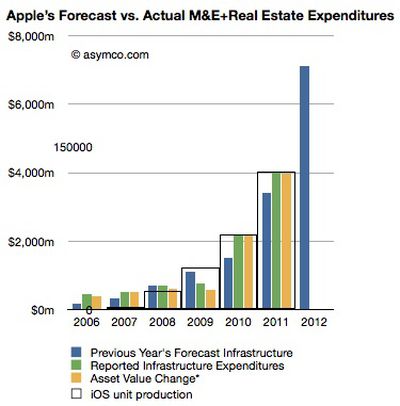Apple Planning Surge in Retail and Cloud Spending in 2012
Last week, Apple released its annual 10-K report, offering a summary of the company's financial performance and other items of interest for fiscal 2011. One interesting tidbit from the report is gaining some attention for its glimpse into the future, as GigaOM reports on a new research note from UBS analyst Maynard Um addressing Apple's planned capital expenditures (CapEx) for fiscal 2012. From the 10-K report:
The Company’s capital expenditures were $4.6 billion during 2011, consisting of approximately $614 million for retail store facilities and $4.0 billion for other capital expenditures, including product tooling and manufacturing process equipment, real estate for the future development of the Company’s second corporate campus, and other corporate facilities and infrastructure.
...
The Company anticipates utilizing approximately $8.0 billion for capital expenditures during 2012, including approximately $900 million for retail store facilities and approximately $7.1 billion for product tooling and manufacturing process equipment, and corporate facilities and infrastructure, including information systems hardware, software and enhancements.
The projected 74% increase in capital expenditures is evidence of Apple's commitment to both retail stores other infrastructure needs, many of which are related to Apple's cloud-based initiatives. On the retail front, Apple has noted that it is planning to open forty new retail stores during fiscal 2012, and is also planning to expand or replace a number of its existing stores that are too small to adequately serve customer demand. Other infrastructure needs include cloud-focused facilities like the North Carolina data center where Apple is building a solar farm and the new corporate campus in Cupertino.

Horace Dediu at asymco has taken a different look at Apple's CapEx within the context of iOS device sales, noting that sales have been been closely correlated with CapEx over the past several years. Dediu's conclusion is that the significant increase in budgeted non-retail CapEx points toward Apple expecting yet another year of 100% growth in iOS device unit sales.
(via Daring Fireball)
Popular Stories
Apple's next-generation iPhone 17 Pro and iPhone 17 Pro Max are less than three months away, and there are plenty of rumors about the devices.
Apple is expected to launch the iPhone 17, iPhone 17 Air, iPhone 17 Pro, and iPhone 17 Pro Max in September this year.
Below, we recap key changes rumored for the iPhone 17 Pro models:Aluminum frame: iPhone 17 Pro models are rumored to have an...
Apple is developing a MacBook with the A18 Pro chip, according to findings in backend code uncovered by MacRumors.
Earlier today, Apple analyst Ming-Chi Kuo reported that Apple is planning to launch a low-cost MacBook powered by an iPhone chip. The machine is expected to feature a 13-inch display, the A18 Pro chip, and color options that include silver, blue, pink, and yellow.
MacRumors...
In 2020, Apple added a digital car key feature to its Wallet app, allowing users to lock, unlock, and start a compatible vehicle with an iPhone or Apple Watch. The feature is currently offered by select automakers, including Audi, BMW, Hyundai, Kia, Genesis, Mercedes-Benz, Volvo, and a handful of others, and it is set to expand further.
During its WWDC 2025 keynote, Apple said that 13...
Apple hasn't updated the AirPods Pro since 2022, and the earbuds are due for a refresh. We're counting on a new model this year, and we've seen several hints of new AirPods tucked away in Apple's code. Rumors suggest that Apple has some exciting new features planned that will make it worthwhile to upgrade to the latest model.
Subscribe to the MacRumors YouTube channel for more videos.
Heal...
Apple is planning to launch a low-cost MacBook powered by an iPhone chip, according to Apple analyst Ming-Chi Kuo.
In an article published on X, Kuo explained that the device will feature a 13-inch display and the A18 Pro chip, making it the first Mac powered by an iPhone chip. The A18 Pro chip debuted in the iPhone 16 Pro last year. To date, all Apple silicon Macs have contained M-series...
Popular accessory maker Anker this month launched two separate recalls for its power banks, some of which may be a fire risk.
The first recall affects Anker PowerCore 10000 Power Banks sold between June 1, 2016 and December 31, 2022 in the United States. Anker says that these power banks have a "potential issue" with the battery inside, which can lead to overheating, melting of plastic...
Chase this week announced a series of new perks for its premium Sapphire Reserve credit card, and one of them is for a pair of Apple services.
Specifically, the credit card now offers complimentary annual subscriptions to Apple TV+ and Apple Music, a value of up to $250 per year.
If you are already paying for Apple TV+ and/or Apple Music directly through Apple, those subscriptions will...
As part of its 10-year celebrations of Apple Music, Apple today released an all-new personalized playlist that collates your entire listening history.
The playlist, called "Replay All Time," expands on Apple Music's existing Replay features. Previously, users could only see their top songs for each individual calendar year that they've been subscribed to Apple Music, but now, Replay All...






















